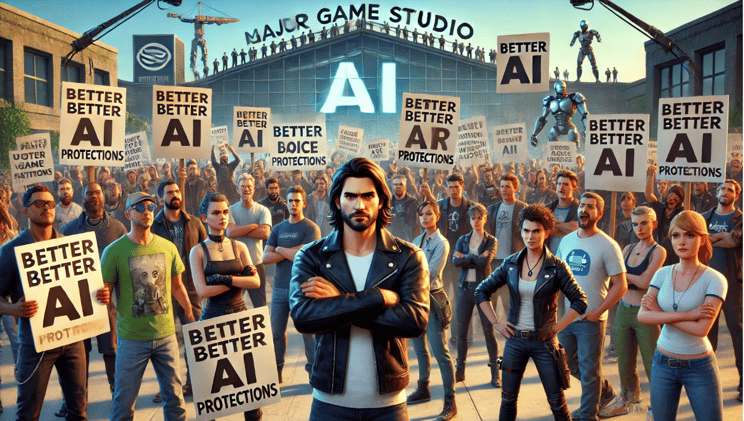Video Game Performers Strike Over AI Concerns
Hollywood’s Video Game Performers Announce Strike Starting at 12:01 a.m. Friday
Hollywood’s video game performers have announced they will go on strike starting at 12:01 a.m. Friday, following failed negotiations for a new contract with major game studios over artificial intelligence (AI) protections. This marks the second strike for video game voice actors and motion capture performers under the Screen Actors Guild-American Federation of Television and Radio Artists (SAG-AFTRA).
Breakdown of Negotiations
After nearly two years of negotiations with major gaming companies such as Activision, Warner Bros., and Walt Disney Co., SAG-AFTRA negotiators reported progress on wages and job safety but significant disagreements over the regulation of generative AI.
Key Points in the Negotiation Process:
- Wages and Job Safety: SAG-AFTRA negotiators have made progress on these fronts, with improvements in compensation for performers.
- Generative AI Regulations: This remains a contentious issue, with major game studios resisting stricter controls on the use of AI in game development.
The Heart of the Dispute: AI Protections
SAG-AFTRA Chief Contracts Officer Ray Rodriguez highlighted a critical concern:
"The industry has told us point blank that they do not necessarily consider everyone who is rendering movement performance to be a performer that is covered by the collective bargaining agreement."
This lack of clarity could lead game companies to train AI to replicate an actor’s voice or create digital replicas of their likeness without consent or fair compensation.
"We strike as a matter of last resort. We have given this process absolutely as much time as we responsibly can," Rodriguez stated. "We have exhausted the other possibilities, and that is why we’re doing it now."
Studios’ Position
Audrey Cooling, a spokesperson for the video game producers, claimed that the companies offered ‘meaningful AI protections.’ However, SAG-AFTRA negotiators like Andi Norris argue that these protections are insufficient, particularly for those performing stunts or creature movements.
"We have made significant progress on wages and job safety, but our members remain concerned about the use of generative AI," Norris said. "The current offer falls short of what we need to protect our performers’ rights."
Economic Impact and Industry Context
The global video game industry generates over $100 billion annually. SAG-AFTRA emphasized that the people who design and bring these games to life are crucial to this success.
Key Statistics:
- Annual Revenue: The global video game industry generates over $100 billion each year.
- Number of Performers Affected: More than 2,500 performers, including voiceover artists, motion capture performers, stunt coordinators, and more, will be impacted by the strike.
Historical Context and Interim Agreements
The last interactive contract expired in November 2022 and did not include AI protections. However, it secured bonus compensation for voice actors and performance capture artists following an 11-month strike in 2016.
Past Strikes:
- 2016 Strike: An 11-month strike by SAG-AFTRA resulted in improved wages and benefits for performers.
- Current Tensions: Despite progress on some issues, the current negotiations have reached a stalemate over AI protections.
Future Negotiations
While the strike signifies a major disruption, both parties have expressed a willingness to return to negotiations. Cooling emphasized that the companies are prepared to resume talks, suggesting a potential resolution may still be on the horizon.
"We remain committed to finding a solution that works for everyone," Cooling said. "We look forward to resuming negotiations and reaching a mutually beneficial agreement."
